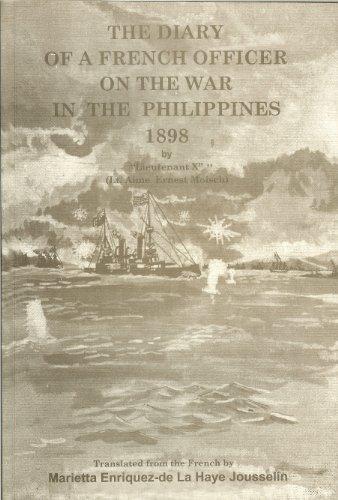“Una Muerte Honorosa”
Rumors are rampant. The English dispatches are suspect and we are advised not to place too much trust in them. The English in Hongkong believe only the Americans. One should pay less attention to the rumors circulating in the city. All the officials in Manila state that the government always communicates with the peninsula, using the cable from Iloilo to Borneo and from there to Europe. They announce victory based on dubious sources, and in consternation, they have to refute their statement the day after. This evening, an unimpeachable source ascertains that the Spanish squadron of Admiral Cervera has escaped the surveillance of the American cruisers and will join the other Spanish ships in Havana. Fifteen days ago, one would never have thought that these people would be defeated. They have not learned any lesson from their defeat and remain nonchalant and boastful. After the shock of an American attack, they have almost forgotten it. They overlook the negligence and the strange passiveness of the government. After all, war to them is primarily a means of dying nobly. Perhaps they are more proud of death than of victory. This aspect of the Spanish character is beyond comprehension. Even if the grandiloquence, the boastfulness, and the chivalry of the Spaniard declines, this violent love of death, and this sensual and mystical attraction to it will always persist.
They take pride in the mere fact that they were unable to do anything. ” … the enemy showed proof of their might, their cannons, and their ships which made them invincible to our methods of fighting … que les hacian invulnerables a nuestras energias y a nuestros medios.”
—What force? What method? Goals and actions should be based on reason. Force is not synonymous with arming oneself with a stick against a 30mm gun; the thing to do is to assess the impact of that weapon and challenge it with one or two of at least the same caliber and to use it more skillfully than one’s adversary. Force is also a matter of strategy.
According to a newspaper article, the curious spectators were hardly impressed by the enemy. . .”of those enemies who, although valiant, have not proven themselves so.” The extent of this self-deception is immense — a self-delusion which flatters their weaknesses and encourages them to continue making the same mistakes. The Spaniard’s unparalleled complaisance will be his ruination. His remarks show no clarity of thought. These people, defeated because of lack of guns, think it is a glorious act to condemn oneself to perish rather than have the necessary strength to ensure victory. But basically, all these heroic ideas spring from national laziness.
Indeed, the supreme argument is “to offer oneself to a glorious death — de buscar una muerte honorosa,” and to refrain from this would-be “passive cowardice.” I see nothing more passive than Spain’s attitude throughout this entire war. Yet, in the final analysis, what is left for them to do? Frontally face death or merely wait for one’s fate? Their degree of resignation varies slightly. But to seek death is also a kind of submission. The refusal to surrender does not merit high honors, and the very ones who praise this virtue do not possess it either.
Personally, I feel that a soldier should not simply give up his life without a fight. The next step for a country that glorifies death should be to bury itself and seal the tomb.
